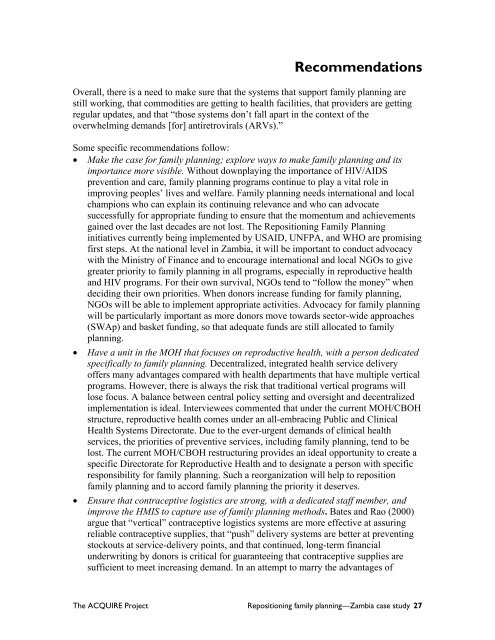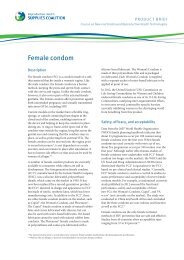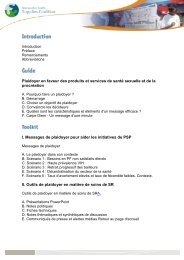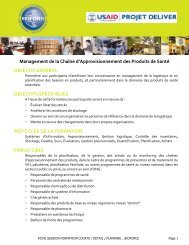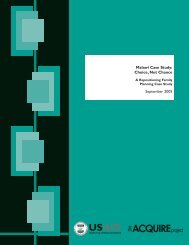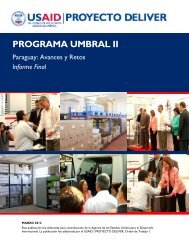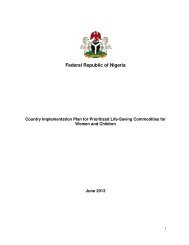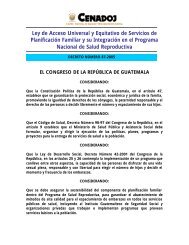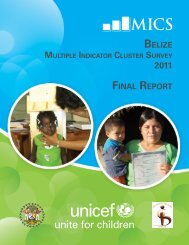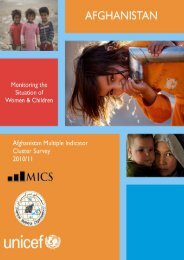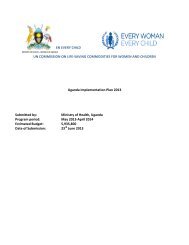Zambia Case Study: Ready for Change - Reproductive Health ...
Zambia Case Study: Ready for Change - Reproductive Health ...
Zambia Case Study: Ready for Change - Reproductive Health ...
Create successful ePaper yourself
Turn your PDF publications into a flip-book with our unique Google optimized e-Paper software.
Recommendations<br />
Overall, there is a need to make sure that the systems that support family planning are<br />
still working, that commodities are getting to health facilities, that providers are getting<br />
regular updates, and that “those systems don’t fall apart in the context of the<br />
overwhelming demands [<strong>for</strong>] antiretrovirals (ARVs).”<br />
Some specific recommendations follow:<br />
• Make the case <strong>for</strong> family planning; explore ways to make family planning and its<br />
importance more visible. Without downplaying the importance of HIV/AIDS<br />
prevention and care, family planning programs continue to play a vital role in<br />
improving peoples’ lives and welfare. Family planning needs international and local<br />
champions who can explain its continuing relevance and who can advocate<br />
successfully <strong>for</strong> appropriate funding to ensure that the momentum and achievements<br />
gained over the last decades are not lost. The Repositioning Family Planning<br />
initiatives currently being implemented by USAID, UNFPA, and WHO are promising<br />
first steps. At the national level in <strong>Zambia</strong>, it will be important to conduct advocacy<br />
with the Ministry of Finance and to encourage international and local NGOs to give<br />
greater priority to family planning in all programs, especially in reproductive health<br />
and HIV programs. For their own survival, NGOs tend to “follow the money” when<br />
deciding their own priorities. When donors increase funding <strong>for</strong> family planning,<br />
NGOs will be able to implement appropriate activities. Advocacy <strong>for</strong> family planning<br />
will be particularly important as more donors move towards sector-wide approaches<br />
(SWAp) and basket funding, so that adequate funds are still allocated to family<br />
planning.<br />
• Have a unit in the MOH that focuses on reproductive health, with a person dedicated<br />
specifically to family planning. Decentralized, integrated health service delivery<br />
offers many advantages compared with health departments that have multiple vertical<br />
programs. However, there is always the risk that traditional vertical programs will<br />
lose focus. A balance between central policy setting and oversight and decentralized<br />
implementation is ideal. Interviewees commented that under the current MOH/CBOH<br />
structure, reproductive health comes under an all-embracing Public and Clinical<br />
<strong>Health</strong> Systems Directorate. Due to the ever-urgent demands of clinical health<br />
services, the priorities of preventive services, including family planning, tend to be<br />
lost. The current MOH/CBOH restructuring provides an ideal opportunity to create a<br />
specific Directorate <strong>for</strong> <strong>Reproductive</strong> <strong>Health</strong> and to designate a person with specific<br />
responsibility <strong>for</strong> family planning. Such a reorganization will help to reposition<br />
family planning and to accord family planning the priority it deserves.<br />
• Ensure that contraceptive logistics are strong, with a dedicated staff member, and<br />
improve the HMIS to capture use of family planning methods. Bates and Rao (2000)<br />
argue that “vertical” contraceptive logistics systems are more effective at assuring<br />
reliable contraceptive supplies, that “push” delivery systems are better at preventing<br />
stockouts at service-delivery points, and that continued, long-term financial<br />
underwriting by donors is critical <strong>for</strong> guaranteeing that contraceptive supplies are<br />
sufficient to meet increasing demand. In an attempt to marry the advantages of<br />
The ACQUIRE Project Repositioning family planning—<strong>Zambia</strong> case study 27


